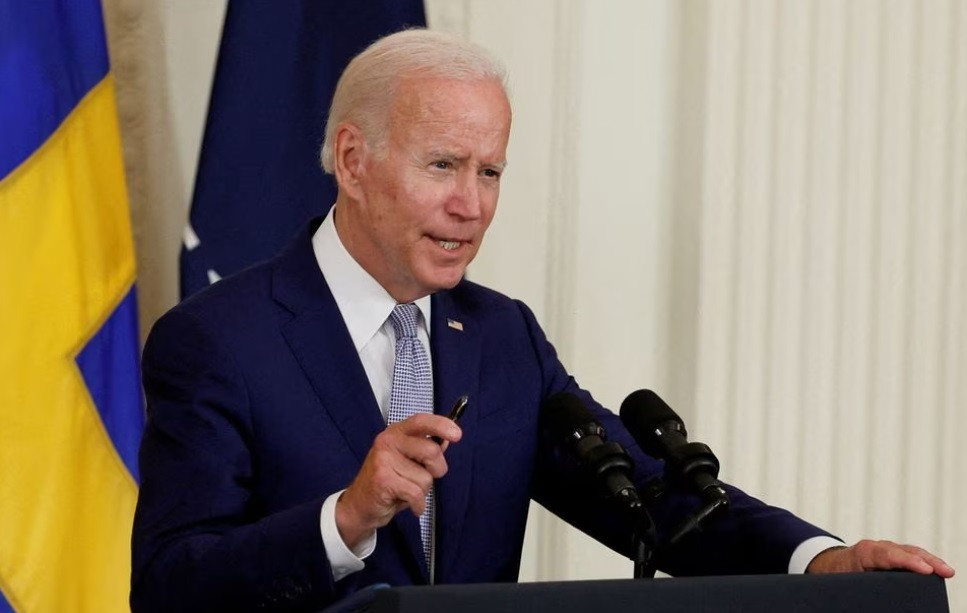President Biden wants to take a strong stance but also avoid escalation regarding Israel's response to Hamas.

According to CNN (USA) on October 12, when President Joe Biden gathered his top advisers to review a draft of his speech on Israel, he made a clear request: The prepared remarks needed to include more details about the horrifying nature of Hamas' attacks on Israel last weekend.
Mr. Biden noted that the American people must understand how shocking and horrific Hamas’ actions were. Then, speaking from the White House, President Biden described: “This is an act of pure evil.”
Biden’s deep and emotional response to the Hamas attack translated into strong US action, including ordering US warships and aircraft to the region, increased intelligence sharing and no effort to encourage restraint in Israeli retaliation.
But the White House will face a delicate balancing act in the coming months as it tries to support US allies while avoiding being drawn into another conflict abroad. It all reflects a complex dilemma for President Biden, who is currently facing two conflicts: in Europe (Russia-Ukraine) and the Middle East, while he is building a re-election campaign based on his experience as a stable and competent leader.
In briefings and closed-door discussions with his close advisers, Mr. Biden has stressed the importance of getting the response right as well as the dire consequences if the United States miscalculates or takes the wrong step.
That balance has been on display both in public and behind closed doors so far. In his discussions with Israeli Prime Minister Benjamin Netanyahu, Biden reiterated that the White House understood the need for an overwhelming response, but he also highlighted the importance of following the rules of war and protecting civilians.
And even as US officials publicly acknowledge Iran’s role in supporting Hamas over the years, they remain wary of the fact that if there is a direct link between Tehran and the ongoing Israel-Hamas conflict, the parties risk being drawn into a broader regional conflict.
Despite the severity of the hostage crisis, the US has maintained that it has no intention of sending troops to the Middle East for now. But that position could change if the conflict escalates. “If Hezbollah starts firing rockets at Israel, that would be considered a real escalation,” said one US official.
John Kirby, a spokesman for the US National Security Council, said the White House had so far seen no force that had exceeded warnings to escalate the conflict, but noted that “we know, that’s not something they want to announce.”
Clearly, with images of the horrors Hamas inflicts on civilians still fresh, support for Israel remains largely unified within the administration and among U.S. lawmakers. But U.S. officials also do not want the crisis to drag on, especially if civilians in Gaza suffer the brunt of Israel’s harsh response to Hamas. Electricity and food are currently in severe shortage in the blockaded area.
Amid concerns that the US is being drawn into a Middle East conflict, a senior Israeli official told CNN that “Israel does not expect Washington to fight for us,” noting that a new US aircraft carrier group positioned off the Israeli coast would help provide “long-range deterrence” in the event of a broader regional conflict.
For his part, US National Security Adviser Jake Sullivan told reporters this week: “I’m not here to draw red lines or give warnings or lecture anybody. I’m here to say that the president (Biden) has directed us to take a series of actions. We are taking those actions and we will continue to do so in the weeks ahead.”
President Biden's advisers acknowledge the past few days have been an incredibly complicated time for him, as he grapples with the second major outbreak of conflict of his presidency.
In short, a measured approach to Israel will be central to President Biden’s response to this weekend’s attacks. A US official said President Biden believes he knows Israeli Prime Minister (Netanyahu) “better than anyone,” and has previously been careful to pressure the Israeli leader to avoid inflaming or escalating the conflict with the Palestinians.
President Biden, however, may face a different problem, as support for Israel has waned among some in the Democratic Party and he heads into a year-long re-election race with the Middle East suddenly front and center in the candidates’ campaigns.
According to Tin Tuc newspaper